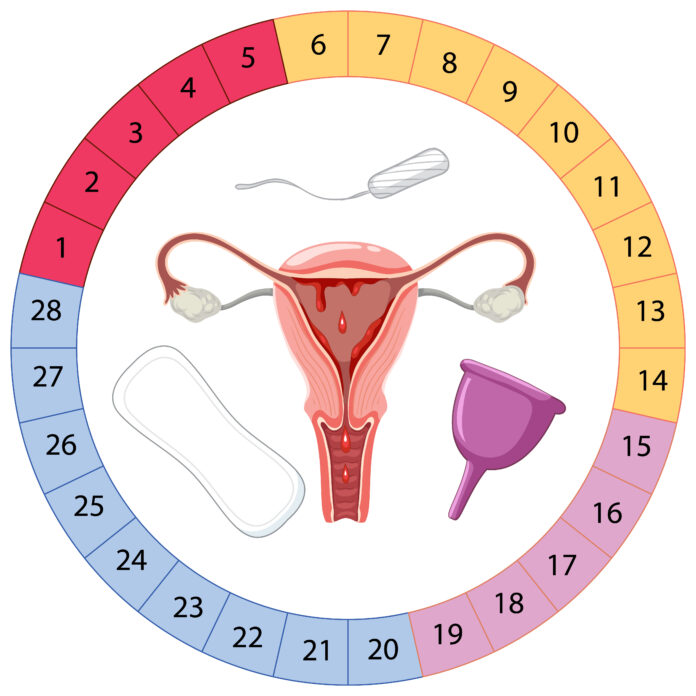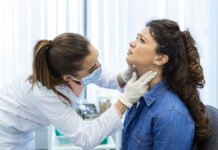Are you thinking about different queries about Menopause? It is a natural process and has a fixed time to arise but the question is, when will it happen to you? When will you lose your reproductive ability and become infertile? All these questions surely come to the minds of the ripe aged women all over the world but most of them don’t have exact answers of these questions. This article has brought the ultimate results of your questions about Menopause, its stages, timing, signs and side effects. It is the phenomenon of losing the reproductive ability in elderly women. Every female has to face this situation in her life due to some hormonal changes in her body. As a female you should prepare yourself for such phase in your life when will you lose your fertility. So, it is recommended to give birth to your children at an early age, like before the age of 45 to 50 years because studies show that in almost 90% females, its signs and symptoms appear at this age and their menstrual cycle goes to an end.
Understanding Menopause
Definition of Menopause: It is the end of the menstruation cycle in females. It can also be defined as the stoppage of periods in females. Due to the variations in the production of some reproductive hormones, females lose their reproductive ability after a specific age. Usually, it happens in late 40s but in some females the symptoms appear in early 40s as well.
Natural vs. Induced Menopause: It is of two types i.e Natural and Induced. Although it is a natural process but it can be induced at any age due to some environmental factors. These factors include;
- Any injury to pelvic limbs or pelvic region.
- Frequent UTIs.
- Surgery of abdominal region.
- Surgery for gender change.
Actually, hormones affect the ovarian follicles which stop the eggs production.
The Role of Hormones: Estrogen and Progesterone are two major hormones produced by gonadal glands in females. These hormones are responsible for the production of eggs in female ovaries and also secrete ovarian follicles to protect the eggs. After the age of mid 40s, the production of these two hormones starts to imbalance. Due to their low and imbalanced production, quality of eggs deteriorates and finally menstrual cycle goes to an end. In different females, it occurs at different ages.
Age of Onset and Stages of Menopause
If you have your last period 12 months before, it might be the first sign of its onset in your body. During this duration, most of the women feel hot flashes, insomnia, soreness of breast and unbearable pains in your abdominal region with weight gain. If you are observing all the above mentioned symptoms in your body. Yes, you are surely near to your permanent Menopause.
Age Range for Menopause: In some women its signs and symptoms appear after the age of mid 30s. This is the time when hormonal changes start appearing in women and this hormonal abnormality keeps on increasing. At the age of 45 years, most of the women suffer from this hormonal disturbance and they feel different recurring symptoms whereas at the age of 50 to 52 years almost all women lose their periods permanently.
Perimenopause: Early Menopausal Transition: At the age of 40+, most of the females feel imbalance in their menstrual cycle. Periods sometimes get less and sometimes get heavier. Periods don’t come at a proper fixed date. Along with these issues hot flashes also occur. This duration is called transitional stage to be without periods within 7 to 9 years. This is the sign that you will lose your reproductive life after some years. Now, your transitional stage has started called Perimenopause.
Menopause: The Official Diagnosis: After transitional menopause, estrogen production get slower and after 7 to 8 years, estrogen production completely stops i.e. you cannot produce eggs in your ovaries, it will be at the age of 45 to 50 years in most of the cases. If necessary go to a healthcare officer to be ensured.
Post menopause: Life Beyond Menopause: The complete stoppage of periods is permanent Menopause and the life span after getting permanent Menopause is known as Post menopause stage of life. Estrogen will not be produced now and ovaries will not produce eggs again. At this stage your hot flashes and other symptoms may be diminished or lessened. In some females, the symptoms continue after a year of permanent menopause and appear often.
Common Signs and Symptoms of Menopause
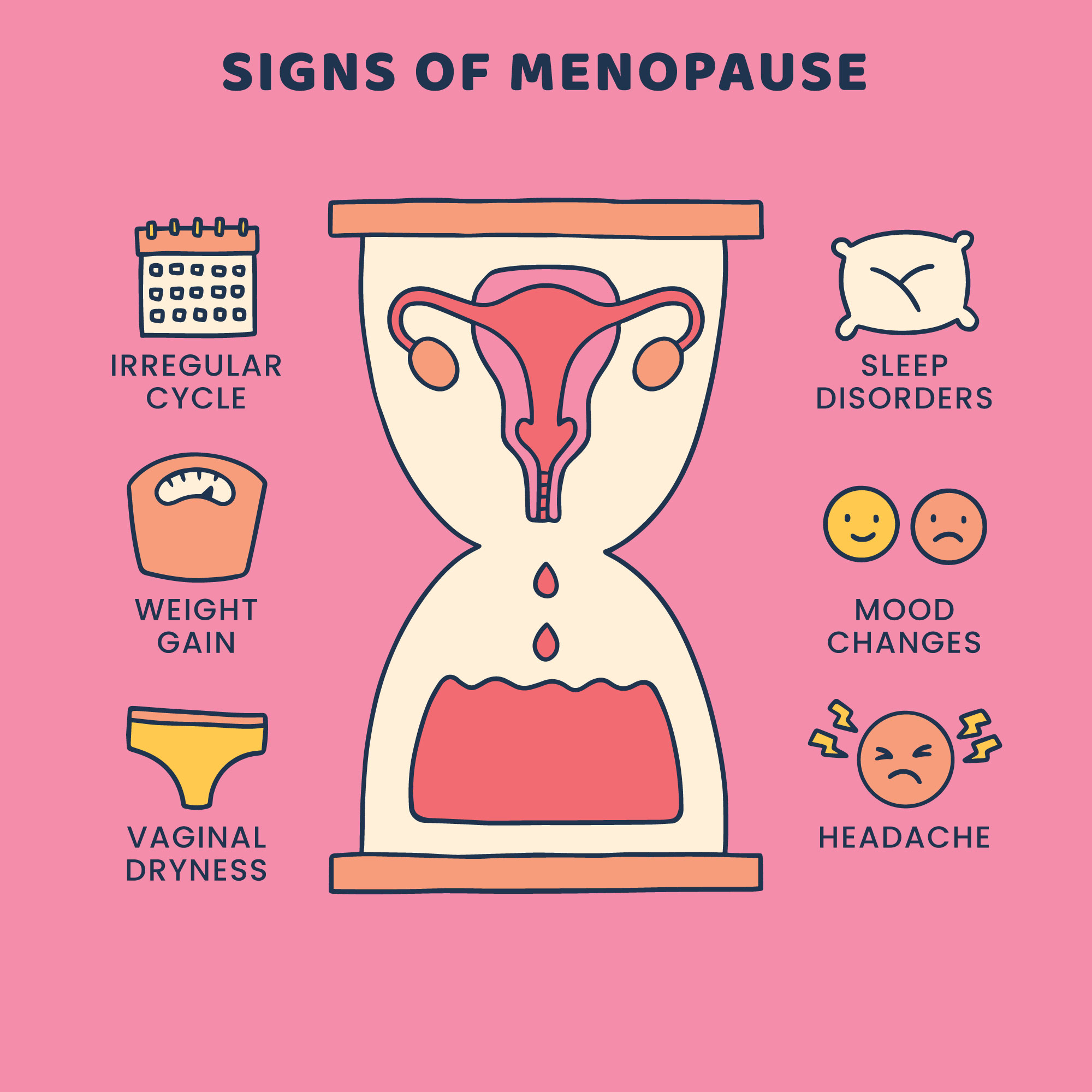
Change in the menstrual cycle is a recognized sign of Menopause. Obviously if a continuous and regular process would disturb you will be attentive to this and try to find out the cause. So disturbance in hormones causes changes in the menstrual cycle along with the feelings of hot flashes, night sweats, vaginal dryness and mood swings.
Hot Flashes and Night Sweats: Hot flashes and night sweating begin at the early stages of perimenopause. In this condition you may feel temperature changes in your body. In your brain the part Hypothalamus controls your body temperature. At the onset of Menopause symptoms it thermostats your body temperature and reset it at a new lower temperature. Sometimes it is a burning sensation and sometimes you feel chills. This may lead to heart palpitations, appetite disturbance and extraordinary sweating.
Changes in Menstrual Cycle: Changes in menstrual cycle like not occurring at fixed date and time may be the alarm for the Menopause stage in your life. Sometimes you have light and sometimes heavy periods.
Vaginal Dryness and Discomfort: Vaginal dryness is a severe discomfort. It may be caused by hormonal imbalance and sudden changes in sex relations but it is also considered the ultimate symptom. Onset of Menopause is always accompanied by irritation in vagina and itching sensation due to dryness causes many UTIs and creates difficulty during sexual intercourse.
Mood Swings and Emotional Changes: 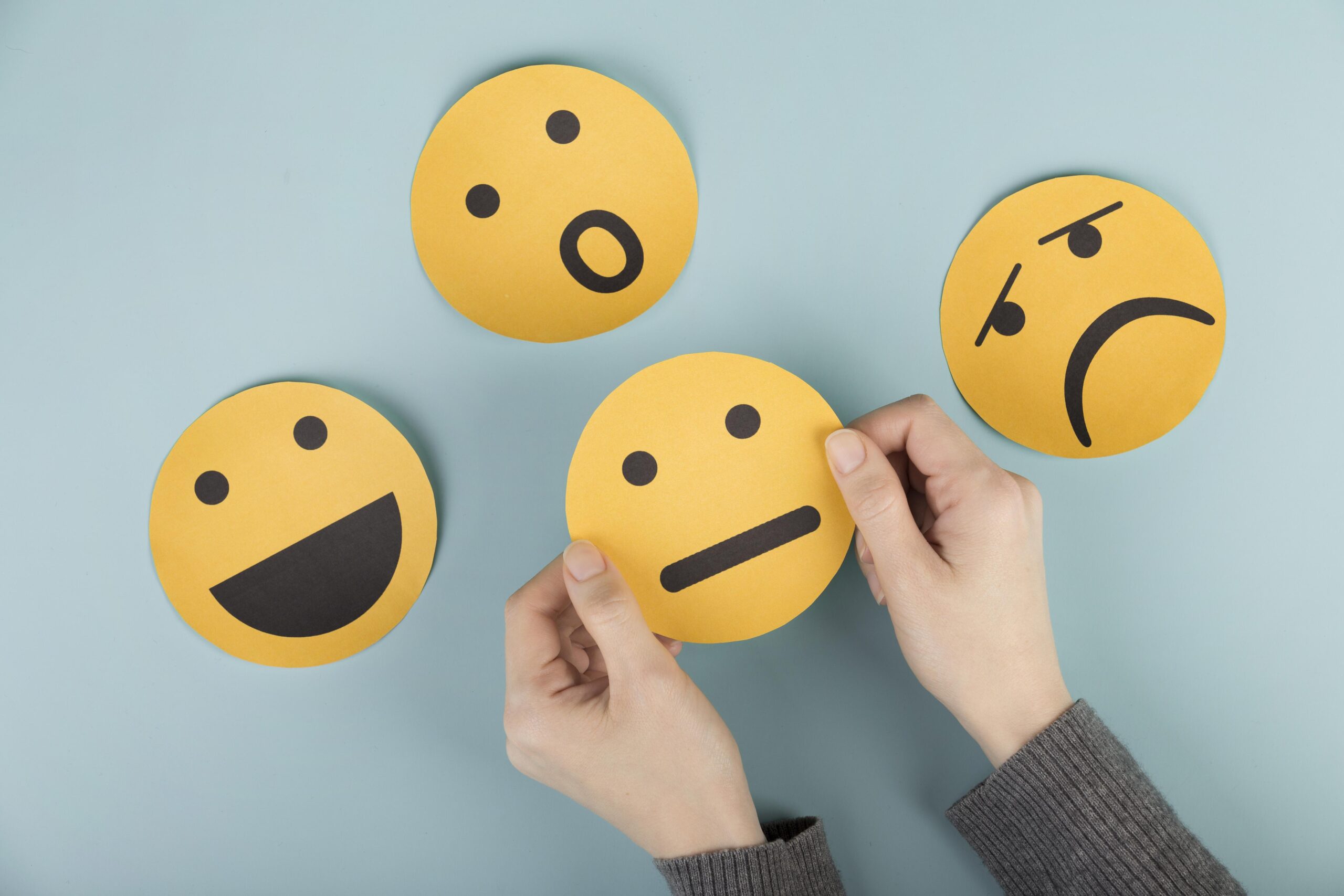 A significant symptom is rapid changes in your emotions and recurring appearance of mood swings. Obviously, Estrogen deficiency affects mental health and becomes a source of irritation, anxiety, and sleeping disorders. All these factors lead you towards mood swings. Although it’s a natural process but as you read it also has side effects so try to consult a healthcare officer if symptoms get more severe. Medicines helping in Estrogen Production will limit the harshness in mood.
A significant symptom is rapid changes in your emotions and recurring appearance of mood swings. Obviously, Estrogen deficiency affects mental health and becomes a source of irritation, anxiety, and sleeping disorders. All these factors lead you towards mood swings. Although it’s a natural process but as you read it also has side effects so try to consult a healthcare officer if symptoms get more severe. Medicines helping in Estrogen Production will limit the harshness in mood.
Physical and Health-Related Side Effects
It is the loss of an extraordinary ability in females. Its symptoms start to appear at 40s and prolong to 7 to 8 years or more. Majority of females suffered by hot flashes, mood swings and irritability issues, these signs enable them to understand that their periods are near to stop but some remain unaware. Some physical side effects in their body make them conscious. Let’s discuss about related physical health issues.
Bone Health and Osteoporosis: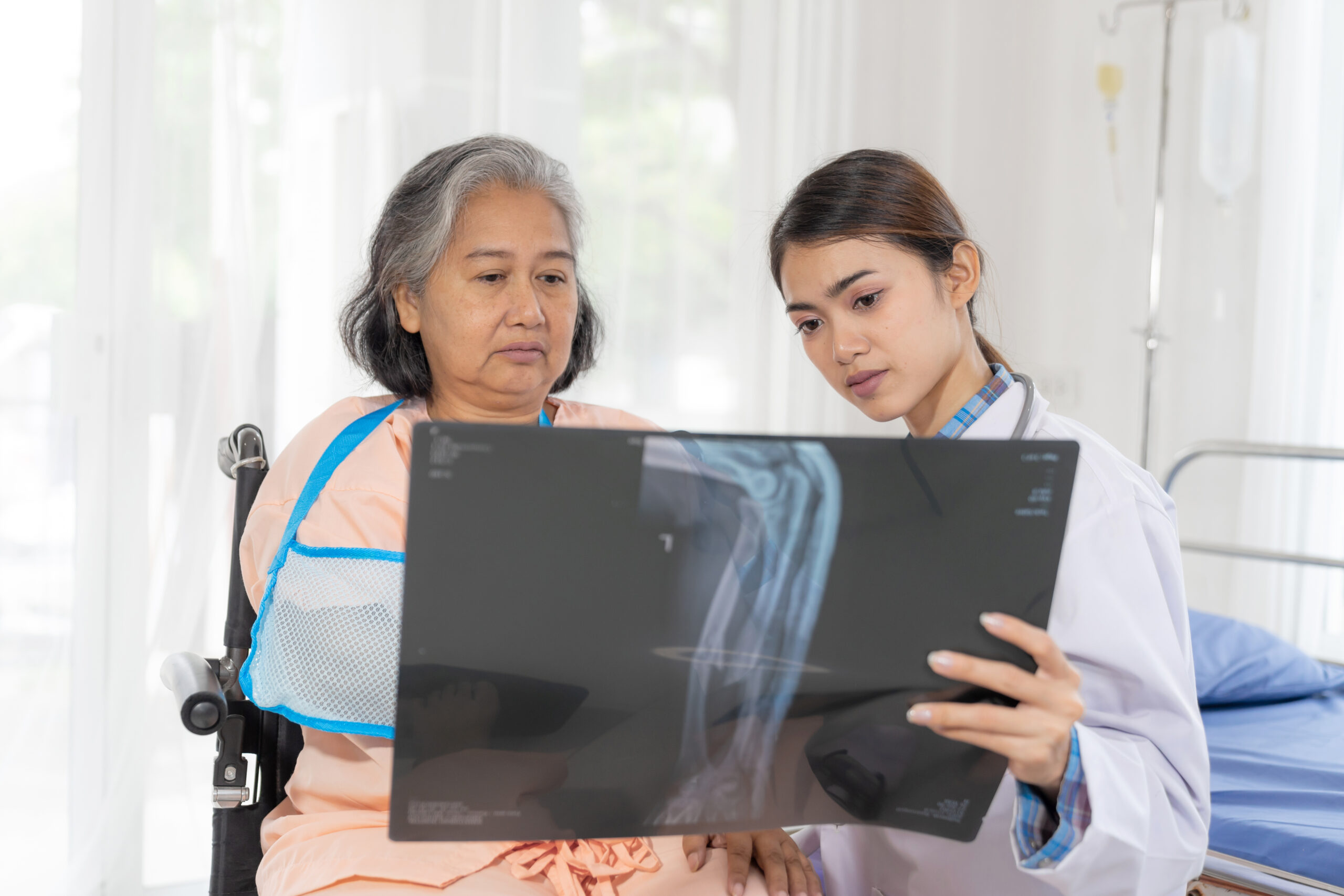 You know well that the skeletal system provides support to your body for making postures, standing, sitting and many more. But, you don’t know that your skeletal muscles consist of compact bones and soft bones. Compact bones are your support but due to lower estrogen levels, the bones get brittle and causes deficiency of bone density. This is a horrible situation. You lose flexibility of body joints which lead you to easy breakage of bones and different joint aches and muscles pain.
You know well that the skeletal system provides support to your body for making postures, standing, sitting and many more. But, you don’t know that your skeletal muscles consist of compact bones and soft bones. Compact bones are your support but due to lower estrogen levels, the bones get brittle and causes deficiency of bone density. This is a horrible situation. You lose flexibility of body joints which lead you to easy breakage of bones and different joint aches and muscles pain.
Cardiovascular Health: Estrogen is a reproductive hormone and affects the sexual organs, but it will be surprising for you that low production of Estrogen causes an increase in cholesterol level. Cholesterol accumulates in blood vessels and proves an obstacle to blood flow. Hence, the blood circulation may be disturbed. You must see your doctor if you feel such symptoms.
Weight Changes and Metabolism: On approaching perimenopause stage, you will feel many changes in your body i.e. moodiness, irregularity in periods, different mental problems, insomnia, hot flashes etc. You will think about all these changes because you would not have changed your living style but you should know that Estrogen production is directly proportional to your muscle mass and energy requirements. More production of Estrogen will boost more muscle mass and vice versa. So, in case of Menopause, your body loses muscle mass and it will cause slower metabolism. It means your body doesn’t need more calories now. So you have to keep strict check and balance on your calories intake per day so that your body weight may be maintained at an optimum level. In majority cases females are unaware of these factors and they continue to take the same diet and as a result they gain weight abruptly.
Sexual Health and Libido: It is the perimenopause, which affects your sexual health. When you have no periods for nearly 10 to 12 months, you feel sexually dull and you find it difficult to be aroused. Ultimately you will lose your desire for sex. This will make your partner bored and the relationship starts to decline. You will surely go through libido i.e. you will lose your sensation of enjoyment during sex and feel it a burden. You will have no thoughts about sex. This may cause depression and anxiety.
Cognitive and Emotional Changes
Under this heading, you will learn that all three stages of Menopause have direct effects on your cognitive abilities.
Cognitive Function and Memory: Menopausal changes arise changes in cognitive domains in females. This process starts with the perimenopause stage and you face memory issues during your working. Your attention and processing speed are also affected by it. Research has been done and the results will surprise you that the majority of women complain about “Brain fog” during menopausal transition. It is because it decreases the supply of glucose to the brain cells. Thus the brain searches for other energy boosters hormones to maintain its functioning. This effort causes memory loss.
Mood Disorders: Anxiety and Depression: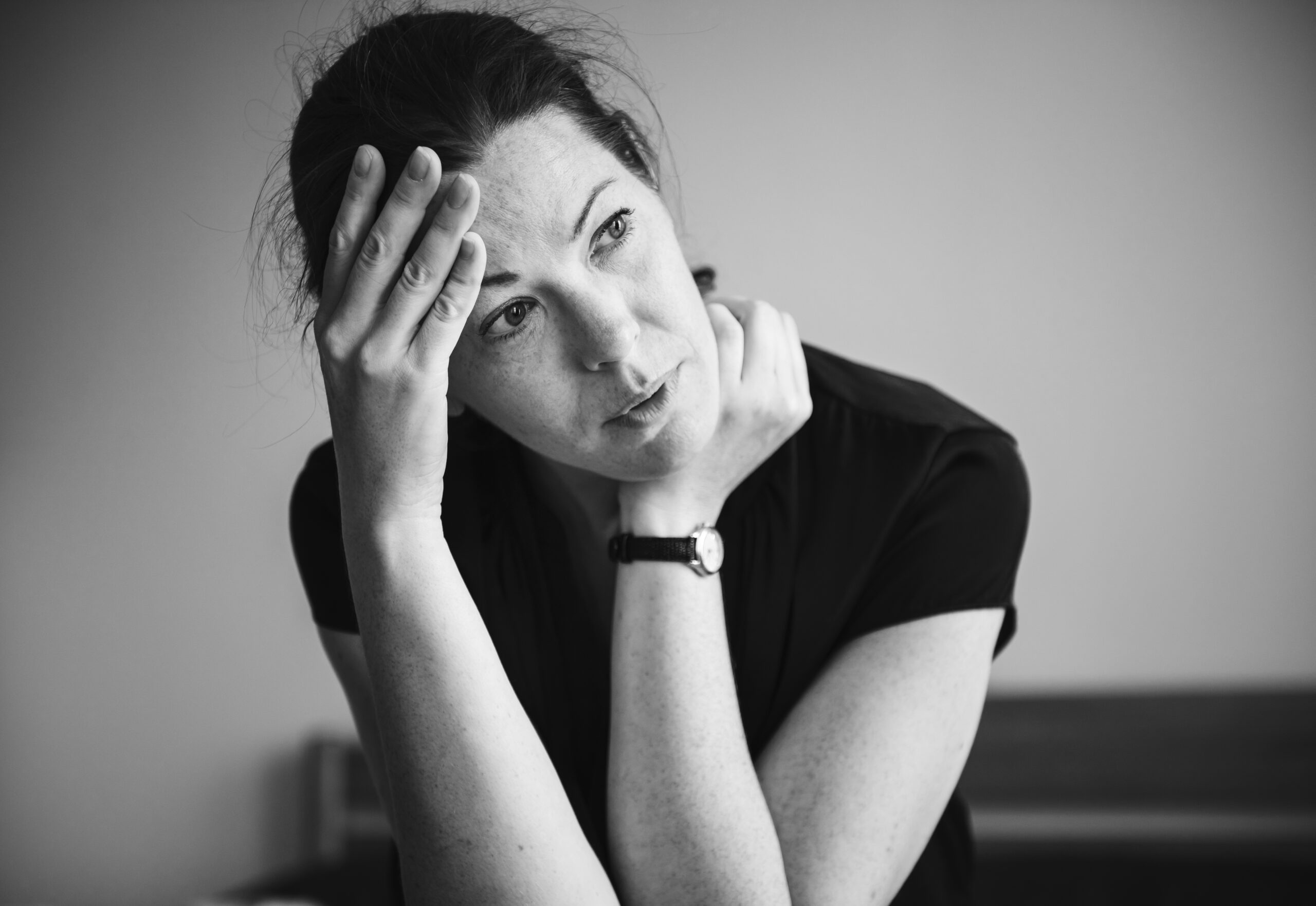 Menopausal transition is closely related to anxiety and depression. As the Estrogen production becomes slower vasomotor symptoms start to appear in your body. Studies have proved that during menopause severe anxiety and erratic behavior is common in females. 25% mood swings are observed during perimenopause and post menopause but the great risk of being depressed is high in 12 months of complete period stoppage.
Menopausal transition is closely related to anxiety and depression. As the Estrogen production becomes slower vasomotor symptoms start to appear in your body. Studies have proved that during menopause severe anxiety and erratic behavior is common in females. 25% mood swings are observed during perimenopause and post menopause but the great risk of being depressed is high in 12 months of complete period stoppage.
Coping Strategies for Emotional Well-being: You will do something better to protect your mental health from severe attacks of anxiety and depression caused by menopausal transition. These strategies will be best for your emotional well-being as well.
- Take a balanced diet.
- Take regular exercise like mindfulness meditation and yoga.
- Spend more time with family.
- Share your feelings with friends.
- Keep yourself busy to achieve a goal.
- Avoid drugs and alcohol.
Lifestyle and Coping Strategies
Complete information about menopausal changes, disorders and side effects may help a woman to cope up with this physical and psychological trauma. Increase in perception and knowledge about this natural phenomenon may help any Menopausal woman to empower herself.
Hormone Replacement Therapy (HRT): Females get harmed by hot flashes and vaginal discomfort due to this. Some medicines are formulated to reduce these problems by inducing some other hormones in the female body to replace Estrogen. Increased night sweating and losing sex desire will be responsible for anxiety so pills are taken to reduce these issues. These medicines are also available in the form of spray and gel.
Diet and Nutrition for Menopausal Health: A balanced diet with plenty of water, fresh fruit juices, and green leafy vegetables are required for menopausal health. Avoid fat, bakery items and spices to sustain your physical health.
Exercise and Physical Activity: Aerobic exercises on a daily basis may relieve you from Menopausal difficulties. Deep breathing while running, yoga and weight bearing exercises have been proven best for the reduction in Menopausal damages to your physical and mental health.
Stress Management and Self-Care: Self-care is an effective way to face the challenges during this phase of life but in some cases the damage through stress is severe enough that may not be cured by self-care. In these situations you may seek help from your medical consultant. Medicines, food supplements and hormone replacement therapy are the sources to get rid of stress.
Seeking Medical Guidance and Support
Importance of Consultation with a Healthcare Provider: Health risk factors during Menopause are increased 3 times than normal conditions. Hormonal changes cause irregular sleeps, imbalance cholesterol levels and chances of diabetes. All these disorders are fatal. To manage these health problems, it is essential to seek help from your healthcare consultant. So that you may take steps to reduce these risk factors through the healthcare officer’s guidance.
Available Treatments and Therapies: Majority of women didn’t sense the discomforts of its stages and are unaware of menopausal disorders and their side effects. They don’t need any therapy. But in some women the symptoms are stronger and more painful. To Treat those painful symptoms and disorders you have to use some medications according to your doctor. Mostly the over the counter pills and tablets are used to treat vaginal discomfort. (HRT) is the therapy used to control hormonal problems.
Support Groups and Resources: Here are some resources for you to treat menopausal health risks.
- Website: The North American Menopause Society(NAMS)
- Website: The Food and Drug Administration
- Website: Menopause–Medline Plus
Menopause Myths and Facts
Everyone should believe that It is not a normal condition. It has many physiological and psychological side effects. Although it is a natural process, it is difficult to admit this for a female. So many myths related to this phenomenon are heard. You have to know only about true ones.
Debunking Common Misconceptions: Different myths are here;
- It is the stopping of periods; but you know that menopause starts from the perimenopause stage
- Symptoms occur 10 to 12 months before permanent Menopause.
- No therapy exists for it but you should know that it’s not a disease. Its painful symptoms can be relieved by medications.
- It is a useless process; but you should have knowledge that many women get happy to be released from pregnancy issues during sex. Some find it pleasant to get rid of the pains of menstruation.
Understanding the Realities of Menopause: It has become a mystery matter but it’s not a mystery. Through this article you will get accurate facts and realities about it.
- All women do not have its symptoms at the same age. It varies person to person.
- Perimenopause has no exact 12 month duration. It also varies person to person.
- All women do not feel the same symptoms.
- HRT is not completely safe therapy.
Promoting Open Conversations: Women are the delicate members of our society and they perform all tasks like male members of society do but women have to face some extraordinary health issues during pregnancy, menstruation every month and Menopause trauma. So, it should be easier for them to talk about it. So that they may discuss the related pains and problems with their friends, family and colleagues. Women need care and support in these conditions. We all should have knowledge to help them out in these conditions.
Conclusion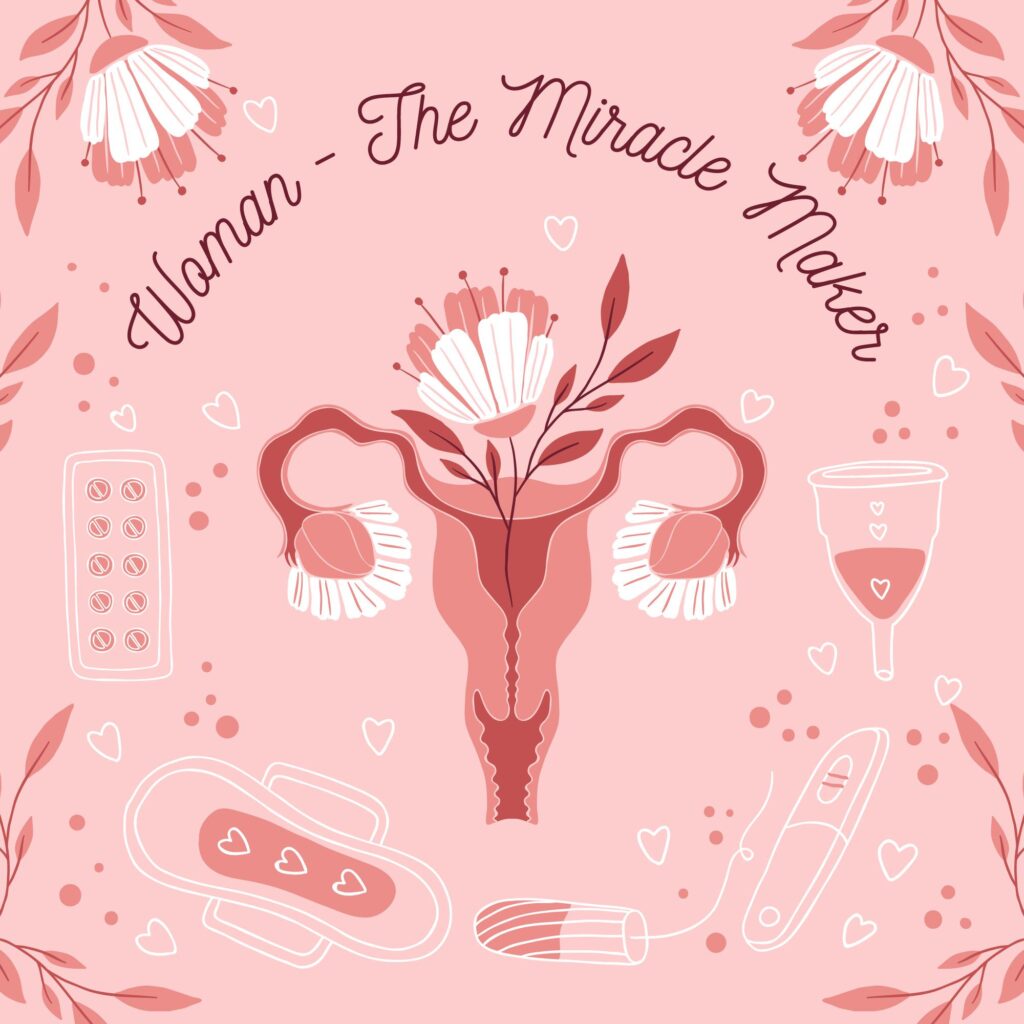 It is the part of life not an ailment. Accept it like other metabolic activities. No doubt it has a drastic feature of being infertile but its law of nature. Painful symptoms may indulge you in some difficulties like hot flashes, night sweating and anxiety as well as hormonal disturbance may cause mood swings but all of these are curable. You just have to take it easy and don’t panic.
It is the part of life not an ailment. Accept it like other metabolic activities. No doubt it has a drastic feature of being infertile but its law of nature. Painful symptoms may indulge you in some difficulties like hot flashes, night sweating and anxiety as well as hormonal disturbance may cause mood swings but all of these are curable. You just have to take it easy and don’t panic.
Some self-care activities, exercise, healthy meals and a balanced lifestyle will help you to reduce problems caused by Menopause and last but not least, consulting with a doctor is the safest way to avoid complications.

